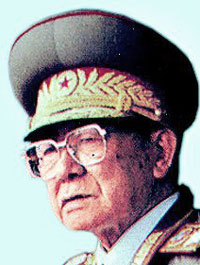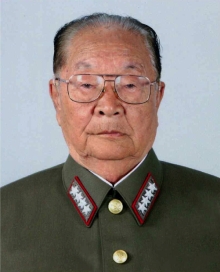Kim Jong-chul, Kim Jung-chul or Kim Jong-chol, is the name of a number of North Korean people, including:
Kim Jong-chul, Kim Jung-chul or Kim Jong-chol, is the name of a number of North Korean people, including:
Kim Jong-chul, sometimes spelled Kim Jong Chol, is a son of former North Korean Supreme Leader Kim Jong Il. His younger brother is current Supreme Leader Kim Jong Un. His older half-brother Kim Jong-nam was assassinated in February 2017.

In the North Korean government, the Cabinet is the administrative and executive body. The North Korean government consists of three branches: administrative, legislative, and judicial. However, they are not independent of each other, but all branches are under the exclusive political leadership of the Workers' Party of Korea (WPK).

Parliamentary elections were held in North Korea on 8 March 2009 to elect the members of the 12th Supreme People's Assembly. They were originally scheduled to be held in August 2008 but were postponed for unknown reasons. Observers of North Korea speculated that it was in relation to Kim Jong-il's ill health.
Parliamentary elections were held in North Korea on 3 August 2003. Representatives were elected for five-year terms to all 687 seats of the Supreme People's Assembly, and also to 26,650 positions in city, county, and provincial People's Assemblies. All candidates were members of the three parties constituting the Democratic Front for the Reunification of the Fatherland.

Marshal Choe Kwang was a military leader in North Korea.

Parliamentary elections were held in North Korea on 25 August 1948 to elect the members of the 1st Supreme People's Assembly. Organised by the People's Committee of North Korea, the elections saw 572 deputies elected, of which 212 were from North Korea and 360 from South Korea.

South Korea participated in the 2006 Asian Games in Doha, Qatar on 1–15 December 2006. South Korea ranked 2nd with 58 gold medals in this edition of the Asiad.

Jon Pyong-ho was a North Korean officer and politician who served as the Chief Secretary of the Korean Workers Party (KWP) Committee of the North Korean Cabinet, and director of the DPRK Cabinet Political Bureau before his retirement in 2010. Jon was described as the 'Chief architect of North Korea's nuclear programme'. Jon was a general of the Korean People's Army and a close adviser to the late Kim Jong-il.

Kim Il Sung died of a heart attack in the early morning of 8 July 1994 at age 82. North Korea's government did not report the death for more than 34 hours after it occurred. An official mourning period was declared from 8–17 July, during which the national flag was flown at half mast throughout the country, and all forms of amusement and dancing were prohibited.
Parliamentary elections were held in North Korea on 9 March 2014 to elect the members of the 13th Supreme People's Assembly.
Byeong-cheol, or Byung-chul, Pyong-chol is a Korean masculine given name. Its meaning differs based on the hanja used to write each syllable of the name. There are 17 hanja with the reading "byeong" and 11 hanja with the reading "cheol" on the South Korean government's official list of hanja which may be used in given names. It was the eighth-most popular name for baby boys born in South Korea in 1950.
Young-chul, also spelled as Yeong-cheol, or in North Korea as Yong-chol, is a Korean masculine given name. The meaning differs based on the hanja used to write each syllable of the name. There are 34 hanja with the reading "young" and 11 hanja with the reading "chul" on the South Korean government's official list of hanja which may be used in given names. According to South Korean government data, it was the eighth-most popular name for baby boys born in 1940, rising to fourth place by 1950.
Chul-soo, also spelled Cheol-su, Cheol-soo, Chol-su, or Chol-soo, is a Korean masculine given name. Its meaning differs based on the hanja used to write each syllable of the name. There are 11 hanja with the reading "chul" and 67 hanja with the reading "soo" on the South Korean government's official list of hanja which may be used in given names.
Sung-chul, also spelled Seong-cheol or Song-chol, is a Korean masculine given name. The meaning differs based on the hanja used to write each syllable of the name. There are 27 hanja with the reading "sung" and 11 hanja with the reading "chul" on the South Korean government's official list of hanja which may be registered for use in given names.
Chul, also spelled Cheol or Chol, is a single-syllable Korean masculine given name, as well as an element in some two-syllable Korean given names. Its meaning differs based on the hanja used to write it.
Min-chul, also spelled Min-chol, is a Korean masculine given name. Its meaning differs based on the hanja used to write each syllable of the name. There are 27 hanja with the reading "min" and 11 hanja with the reading "chul" on the South Korean government's official list of hanja which may be used in given names.
Kim Yeong-cheol or Kim Yŏng-ch'ŏl (Korean: 김영철) is a Korean name consisting of the family name Kim and the given name Yeong-cheol, and may also refer to:

Parliamentary elections were held in North Korea on 10 March 2019 to elect the members of the 14th Supreme People's Assembly. The elections were announced on 6 January 2019. With only one candidate on the ballot in each constituency, outside observers described it as a show election. 687 candidates for the DPRK deputies to the SPA were elected. Kim Jong Un did not stand for election, marking the first time that a North Korean leader did not participate as a candidate.
Pak Jong-chol (박정철) may refer to: